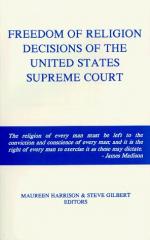|
This section contains 2,921 words (approx. 10 pages at 300 words per page) |

|
Freedom of religion is recognized as a fundamental right in both the United States Constitution and international law. Those who oppose religious freedom usually do so because they believe that obedience to religious authority is more important than freedom of conscience or that religious thought is a superstitious belief system that impedes progress and rational thinking. However, by most modern standards fostering a regime of religious freedom generally is deemed to be a desirable aim of government because it provides individuals with the ability to structure their existence around a set of core beliefs that give their lives meaning.
Evaluating what is meant conceptually by religious freedom, or even what constitutes a religion, is a difficult undertaking, however, and raises many serious concerns. Should government have the authority to treat spiritual beliefs in a legal manner, whether favorable or not, that is...
|
This section contains 2,921 words (approx. 10 pages at 300 words per page) |

|


